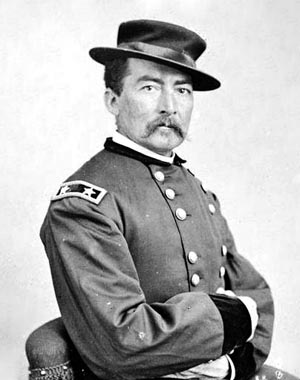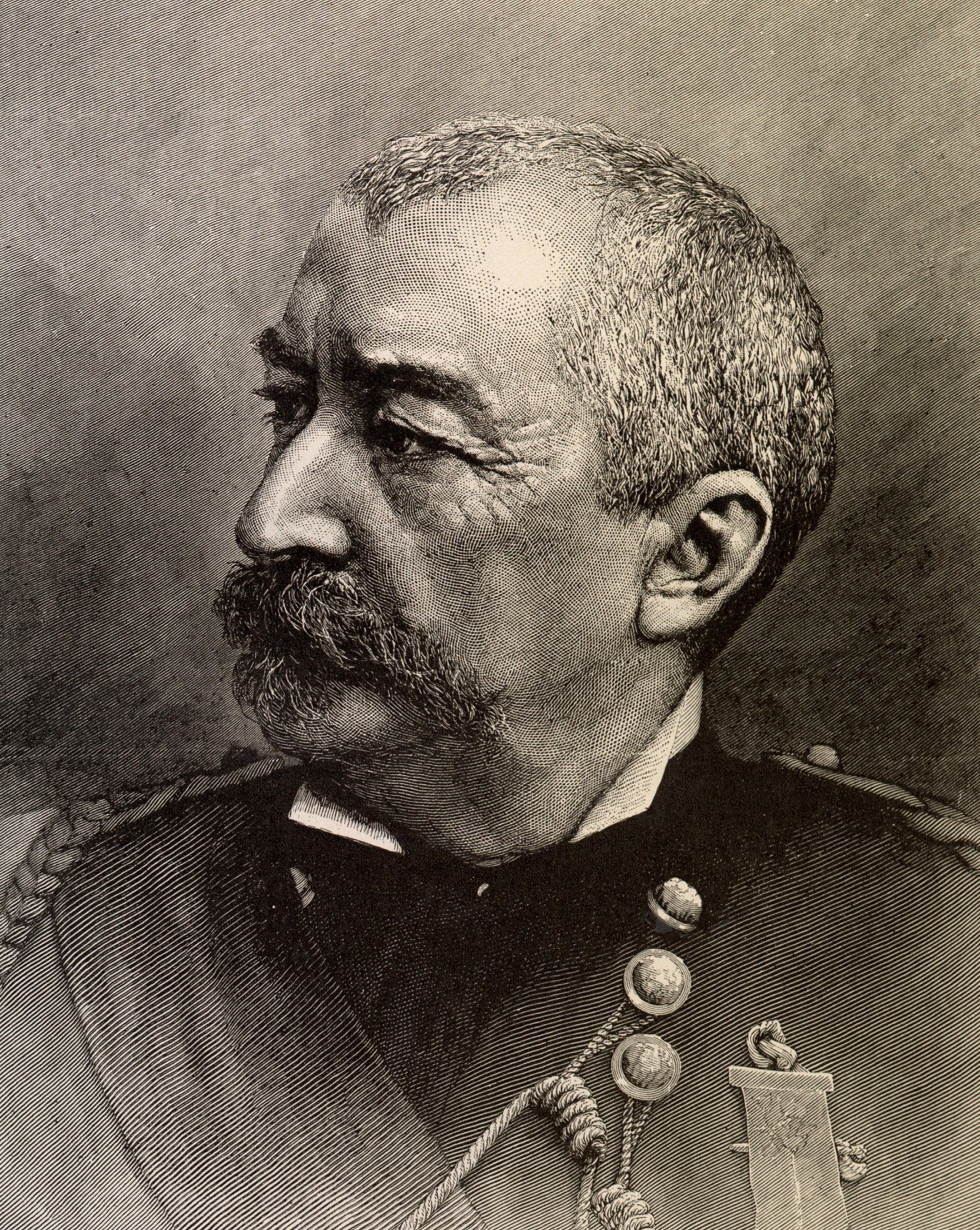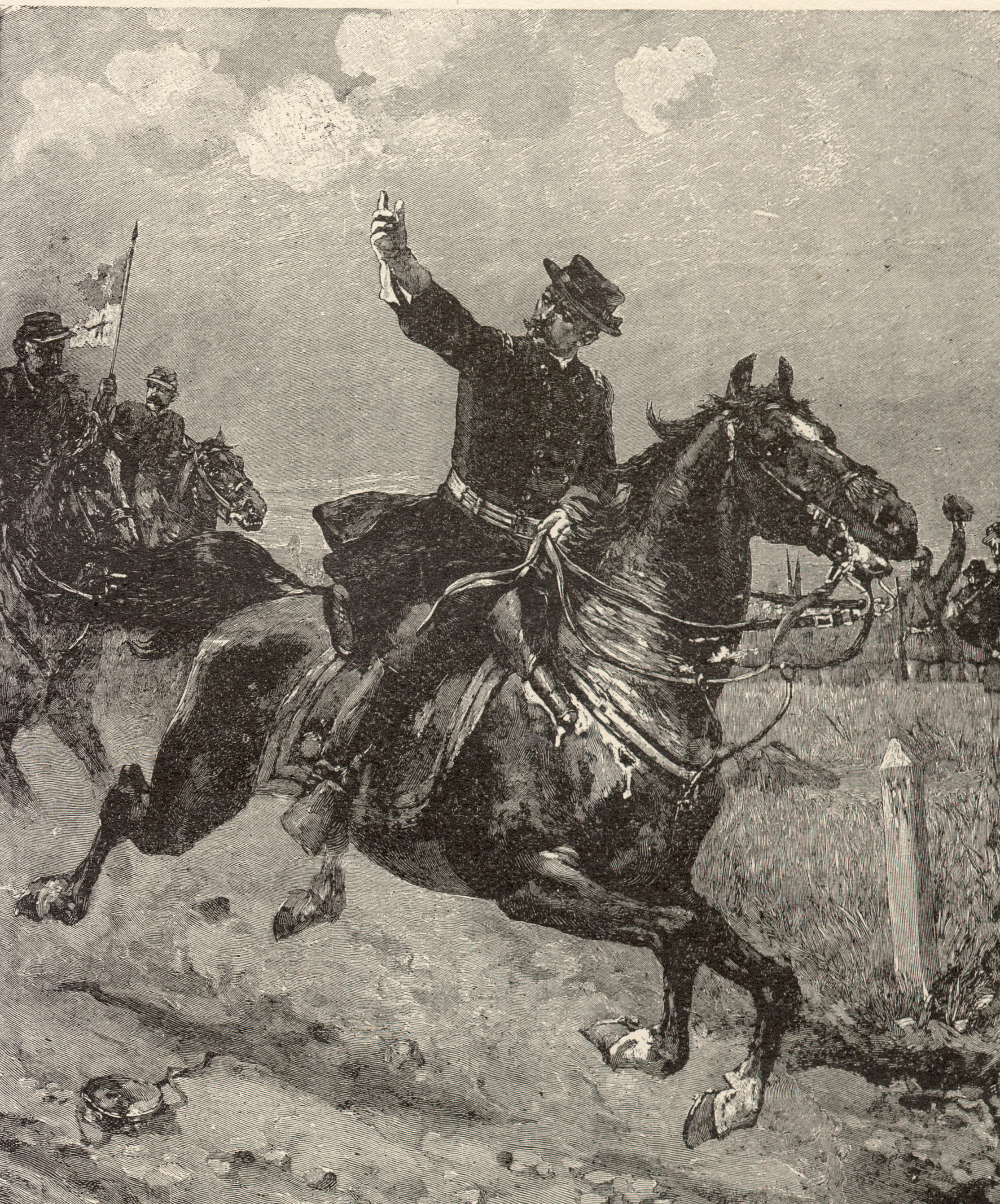

In 1848 Congressman Thomas Ritchie, who knew both Phil and his father, obtained an appointment to West Point for Phil. In 1851, his third year at the Point, he was suspended for a year for fighting with a fellow cadet, William Terrill, Va. Brig. Gen., Union. Phil graduated 34th in a class of 52 in July, 1853, and was assigned to the 1st Infantry at Fort Duncan, Texas, as a 2nd Lt. In 1855 he was transferred to the 4th Infantry in the Pacific Northwest. In April, 1856, he was assigned to duty at the Grand Ronde Indian Reservation in Yamhill County, Oregon, and was promoted to 1st Lt.
After the start of the Civil War, (April 4, 1861) Phil was promoted to Captain and in September of 1861, was called east to St. Louis for duty with the Union Armies of the West, the first step in his journey to greatness. Sheridan was assigned to supply under Gen. Halleck but eventually convinced him he would be of better service in the field and was reassigned to Gen. Curtis who was preparing to drive the Confederates out of southern Missouri. At this point Sheridan, who had met up with General William T. Sherman, was recommended by Sherman to be given command of one of Ohio's volunteer regiments but was turned down. Then Gen. Gordon Granger requested Sheridan be given command of the 2nd Michigan Cavalry vacated by Granger's promotion. He was accepted and jumped from Capt. to Colonel overnight. (May 25, 1862)
Two months later Sheridan was stationed at a forward post near Booneville, Mississippi. The Confederates pressed forward with 5,000 to 6,000 troopers to wipe out Sheridan's annoying outpost of only 827 men. Phil was equipped with repeating rifles and pistols which gave him some advantage but in repelling the enemy he proved his military genius. By loading troops on a train and discharging them noisily at Booneville, silently marching them back up track and reloading and discharging them time and again he deceived Confederate General Chalmers into thinking he was being reinforced. By this and other tactics Sheridan was able to rout a much larger force and because of this action Phil was commissioned Brig. General. He was at this time only 31 years old. After this engagement Sheridan was ordered to the town of Rienzi, Mississippi, and it was here a friend, Colonel Campbell of the 2nd Michigan, gave Phil a large Morgan horse which he promptly named Rienzi, and which later carried him to fame at the battle of Cedar Creek, Virginia.
Sheridan's next engagement was under Gen. Rosecrans at Murfreesboro on Stones River south of Nashville Tenn. He played an important part in holding back the Confederates under Gen. Bragg. In later years Grant stated that in this battle Sheridan saved Rosecran's army. He should have also added Gen. "Pap" Thomas' name. It was principally for Phil's services at Stones River that he was promoted in April, 1863 to Major General. During the battles of Chickamauga, Missionary Ridge, and Lookout Mountain, near Chattanooga, Tenn., Phil fought with Generals Grant and Sherman. Sheridan's division was one of the forces which swept to the top of Missionary Ridge and with his division pursued the enemy and captured much equipment and prisoners.
On March 12, 1864 Gen. Grant was appointed General-in-Chief of the Union Armies, he soon called Phil to join him in Washington. Here Sheridan was appointed Chief of Cavalry, Army of the Potomac. As aides-de-camp Phil chose his brother Mike and Lieut. T. W. C. Moore, Capt. James W. Forsyth, an old friend, was a staff officer. Sheridan's main area of operation was the Shenandoah Valley. Here he contested Gen. Early's Confederate troops, destroyed crops which were the breadbasket of the Confederate army, defeated and killed Gen. J.E.B. Stuart (famous cavalry leader of the south) and eventually, in the battle of Cedar Creek, drove Early out of the valley. As the war neared its end Sheridan was the leader in forcing Gen. Lee out of his Petersburg, Va. defenses and eventually cutting off his retreat at Appomattox Court House.
At the end of the war Sheridan was sent to Texas to maintain peace with Mexico. Napoleon III had installed Maximilian and Carlota to the throne of Mexico. By maneuvering and threats he was able to install peace and force France to withdraw their claims. After serving sometime in New Orleans, La. as head of Reconstruction he was relieved after much controversy and was ordered to take command of the Department of the Missouri in Sept. 1867. Here he was ordered to subdue the Indians and place them on reservations. Several treaties were drawn up, few of which were kept due to the white man's encroachment on the Indian reservations.
In 1869, after Grant became president and General Sherman became General of the Army, Sheridan was appointed lieutenant general with headquarters in Chicago. In this capacity he traveled throughout the west and from this knowledge was later instrumental in having Yellowstone declared a national park. He also went to Europe as an observer with Prussia in the French and Prussian War. Returning to Chicago he presided over the Great Chicago Fire of October 7-8, 1871. He brought troops into the city to stop looters and directed fire fighting and reconstruction.
On June 3, 1875, Sheridan married Miss Irene Rucker, the youngest daughter of Gen. Daniel H. Rucker. She was 22 years younger than Phil. The couple had four children --- Mary, Irene and Louise (twins), and Philip Henry Jr. None of the girls married. Philip Jr. married and had a son, Philip II. In 1883 Gen. Sherman reached retirement age. Lieutenant General Sheridan assumed the nation's highest military office at the comparative youthful age of fifty-two. In 1887 he had built a summer cottage in Nonquit, Mass. overlooking Martha's Vineyard. The next year he suffered a series of heart attacks. Congress revived the grade of full General and he was given his fourth star by President Grover Cleveland. He was the fourth man in U.S. history to be so honored. (Washington, Grant, Sherman, and Sheridan) At 10:30 p.m., Sunday, August 5, 1888, Philip Henry Sheridan passed away at Nonquit, Mass. He lay in state at St. Matthew's Church in Washington, D. C., and was laid to rest in Arlington Cemetery August 11th. General Sheridan's father and mother, brothers Patrick and John, and sister Mary are buried in Holy Trinity Cemetery in Somerset, Ohio. Brother Michael, who was Phil's aide during the Civil War, is buried in Arlington Cemetery.
| Compiled by Bob Miller |
| Somerset, Ohio |

Sheridan, PHILIP HENRY, military officer; born in Albany, N. Y., March 6, 1831; graduated at West Point in 1853; served with much credit in Texas and Oregon, doing good service in the latter region, and settling difficulties with the Indians; was made captain in May, 1861, and during the summer was president of a military commission to audit claims in Missouri. In December he was made chief commissary of the Army of the Southwest, and was on the staff of General Halleck at Corinth performing the same duties. In May, 1862, he was made colonel of the 2nd Michigan Cavalry; on June 6 defeated Forrest's cavalry, and on July 1 repulsed and defeated a superior Confederate force under Chalmers at Booneville, Miss.
General Phil Sheridan
He was then at the head of a brigade of cavalry, and was made brigadier-general. In August he defeated Faulkner's cavalry in Mississippi. Late in September he took command of a division in the Army of the Ohio, and led another division at the battle of Perryville. He also commanded a division with great efficiency in the battle at Stone River, and for his services there he was made (Dec. 31) major-general of volunteers. He afterwards rendered signal service in the battles of Chickamauga and Missionary Ridge, when he was transferred to the Army of the Potomac (April, 1864) as chief of cavalry.
When the Federal army emerged from the Wilderness, in 1864, General Sheridan was sent to cut Lee's communications with Richmond. This was the first of the great raids of that leader in Virginia, and was a short but destructive one. He took with him a greater portion of the cavalry led by Merritt, Gregg, and Wilson, crossed the North Anna on May 9, and struck the Virginia Central Railroad, capturing Beaver Dam Station. He destroyed 10 miles of the railway, its rolling stock, 1,500,000 rations, and released 400 Union prisoners on their way to Richmond. There he was attacked by Stuart and his cavalry, but was not much impeded thereby. He pushed forward, and on the morning of the 11th captured Ashland Station, on the Fredericksburg road, a few miles from Richmond, where he destroyed the railroad for 6 miles and a large quantity of stores. He was charged with menacing Richmond and communicating with the Army of the James, under General Butler. A few miles from Richmond he had another sharp contest with Stuart, and drove him and his cavalry towards Ashland. Stuart was killed, and General Gordon was mortally wounded. Sheridan still pressed on, and made a dash upon the outer works at Richmond. Custer's brigade carried them at that point and made 100 prisoners. The inner works were too strong for cavalry. The Confederates gathered, and in a fight Sheridan was repulsed. He led his command across the Chickahominy, fighting a Confederate force at Meadow Bridge; destroyed a railway bridge; rested three days at Haxhall's Landing, on theJames, and procured supplies; and then, by way of the White House, leisurely returned to the Army of the Potomac.
General Phil Sheridan Famous Ride
In the campaign against Richmond until August, 1864, he did signal service in making destructive raids on Lee's communications. On Aug. 1 he was detached to the valley of the Shenandoah, where he defeated the Confederates in several engagements. During this campaign General Wright was defeated by General Early on Oct. 18, 1864, at CEDAR CREEK (q. v.). Sheridan at the time was in Winchester, and as soon as he got the news he rode to the front at a swinging gallop, rallied the Nationals, and crushed Early. Sheridan's ride has been immortalized in poetry, art, and song.
Sheridan left Winchester on Feb. 27, 1865, with about 10,000 men, composed of the divisions of cavalry of Merritt and George Custer. To the latter division was added a brigade of West Virginia troops under Colonel Capehart. Sheridan's troops moved rapidly up the Shenandoah Valley towards Staunton. On the way they met Rosser, with 400 men, who was disposed to dispute the passage of a fork of the Shenandoah; but he was soon chased away, and the column moved on to Staunton and Rockfish Gap. Early, with 2,500 men behind strong entrenchments, was at Waynesboro to dispute their passage. Custer soon routed him, capturing 1,600 of his men, with eleven guns, seventeen battle-flags, and 200 loaded wagons, with a loss of less than a dozen men. This finished Early as a military leader.The raiders destroyed Confederate property in the vicinity valued at $1,000,000. During that night Sheridan went over the Blue Ridge in a drenching rain, and entered Charlottesville late the next day, where he waited for his pontoons and ammunition to come over the mountains. In the mean time his troops destroyed bridges, factories, depots, and the railway in the direction of Lynchburg for about 8 miles. Satisfied that the latter place was too strong for him, he divided his force and pushed for the James River. Rains had so swollen the river that his pontoons would not span it. Proceeding eastward, he destroyed the James River Canal (then the chief channel of supplies for Richmond) and numerous bridges. This produced the greatest consternation in Richmond. The Confederate government prepared to fly, and the families of officials packed for a journey. The Congress, made nervous, wanted to adjourn and depart, but they were persuaded to remain. From Columbia, where Sheridan rested a day, he dashed off to the Virginia Central Railway, which he destroyed for the distance of 15 miles. Then Custer in one direction, and Devin in another, made complete destruction of railways and bridges, as well as supplies, in Lee's rear, inflicting a more serious blow to the Confederate cause than any victory during the last campaign. Sheridan then swept around by the White House, and joined the army before Petersburg on March 26. He had disabled fully 200 miles of railway, destroyed a vast number of bridges, and property to the value of several million dollars.
After the war he was in command in Louisiana and Texas, and enforced the "reconstruction" acts there, for which he was removed by President Johnson in August, 1867. He was made lieutenant-general in March, 1869, and general of the army, June 1, 1888. He died in Nonquitt, Mass., Aug. 5, 1888